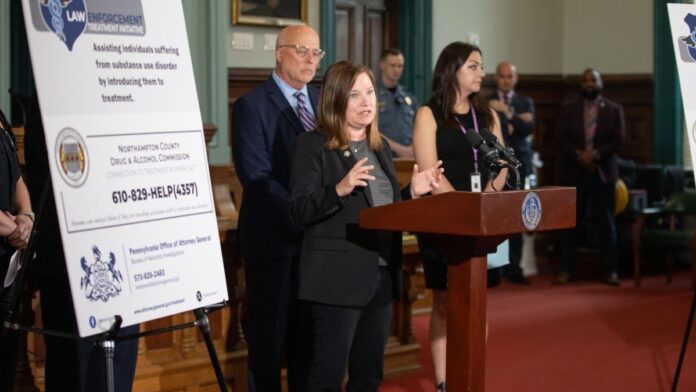In a groundbreaking operation, Pennsylvania Attorney General Michelle Henry and the Pennsylvania State Police arrested 22 individuals involved in a Philadelphia-based human trafficking ring on October 22, 2024.
This investigation marks a shift in how the state addresses the commercial sex industry, as it targets not only the alleged leader but also the entire network, including financial managers, drivers, and even sex buyers.
The new approach is a departure from the typical investigations in Pennsylvania, which have previously focused on either the supply (sex sellers) or demand (sex buyers) in isolated operations.
While these standalone “prostitution stings” have targeted either traffickers or the individuals purchasing sex, this latest investigation, the first of its kind in the state, expands the scope to target all levels of the operation.
Law enforcement arrested the traffickers and 16 men who allegedly paid for sex, as well as key facilitators in the trafficking enterprise.
One of the significant issues with prior investigations is the tendency to criminalize victims by focusing on the people caught in prostitution, even when they are trafficking victims.
The new approach in Pennsylvania, which does not charge the victims with prostitution, acknowledges that those exploited are victims rather than criminals.
Pennsylvania’s human trafficking laws define the crime as the use of force, fraud, or coercion for commercial sex acts.
In 2023, Philadelphia County led the state in trafficking convictions, with 19.
Overall, 304 people have been charged with trafficking-related offenses across Pennsylvania since 2014, with nearly half of these occurring in or around Philadelphia.
The recent sting is unique not only because it addresses all aspects of the trafficking operation but also because it signals a broader shift in law enforcement strategy.
By going after the entire trafficking structure, from the leadership to the buyers, this operation challenges the market dynamics of commercial sex.
Economic theory suggests that as long as there is a demand for sex, traffickers will exploit victims to meet that demand.
Therefore, reducing demand by targeting buyers is crucial in curbing human trafficking.
The Pennsylvania Attorney General’s decision to charge all participants in the operation, from the traffickers to the customers, reflects a deeper understanding of the problem.
This new method of tackling trafficking could signal a turning point for Pennsylvania and inspire other states to adopt a more comprehensive approach to reducing human trafficking.





